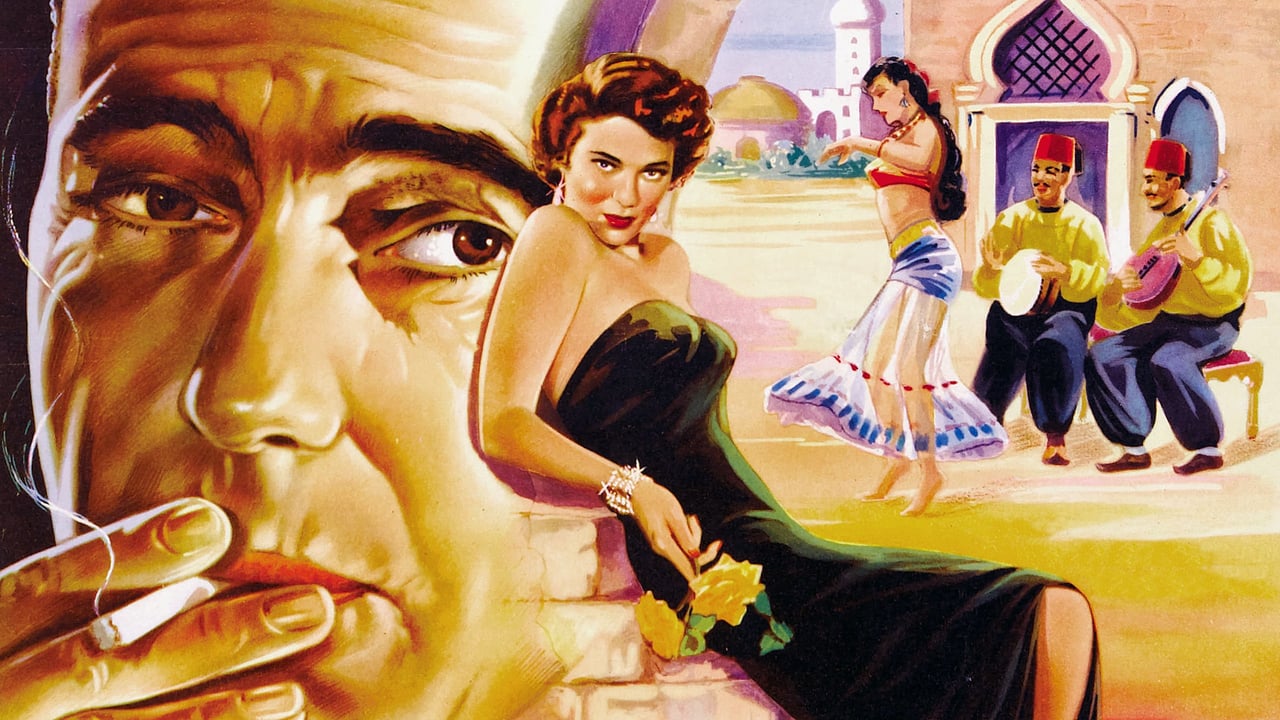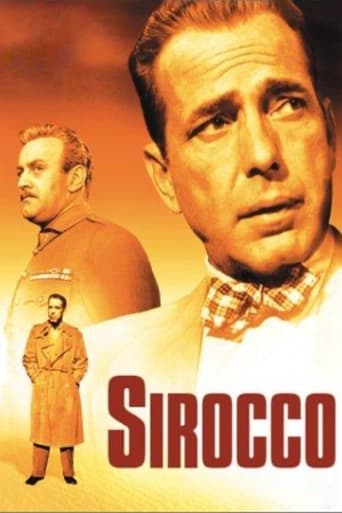

This is a most unusual movie for its time, and it is fascinating to read the comments on it here on the IMDb. Many viewers are apparently undecided what to make of Sirocco as it does not fit any of the known stereotypes. This is neither Algiers (1938) nor Casablanca (1942), there is no romance, you don't find anything exotic about the place in question (Damascus, Syria) and no great friendships are about to develop. It is basically a movie about people who are confronted with a drab and hopeless situation (messagewise I would compare it with The Sand Pebbles (1966)). It painfully reminds todays viewers of the ongoing conflicts in Afghanistan and Iraq (well, the Jasmine salesman bolts off before his handgranades go off in the cafe, the suicide bomber had not been invented yet). Western powers (they have a mandate from the League of Nations) are pitted against so called "patriots" (they have no mandate at all) in a bloody battle without a discernible cause. The Bogart character is an opportunist arms dealer and a coward to boot. At one time he really hits rock bottom in the Catacombs underneath the city as he tries to hide in his tattered Bogey-raincoat - one of the many great visual moments in this beautifully photographed nightmare of a movie with its superb set design.The main message of Sirocco is a depressing one: If things turn bad, the efforts of single individuals are of negligible effect. We have a disillusioned French officer (Lee J. Cobb who I have never seen better). He wants to prevent a planned execution of civilians as a retaliatory act after an ambush, not out of idealistic motives or with any hope but just because he is sick of all the killing. Like all the other characters he gets bogged down by the circumstances and in the end departs on a meeting with the "patriots" with the Bogart character's help. Everyone agrees that this action is meant to be a suicide. The officer even gets out of his uniform which heretofore had the function of a corset.Great sets and scenes abound here. Damascus is a place of eternal night - and we never get out of the place into the open. The Roman Catacombs seem to be inspired by Giovanni Piranesi's "carceri" drawings. There is a great scene in which the Bogart character buys a belly dancer's finger cymbals. Another scene begins with the focus on a visibly tender and juicy steak which the Bogart character starts cutting into. "He brings his own food", the waiter explains to other patrons who would like the same. What a better way to depict a war profiteer?As the lines above suggest, the storyline of Sirocco is pretty sprawling and the film is more of a situation than a story. That makes it only more realistic and instructive. Our time is right for anti-war movies of this kind. In can recommend it.
... View MoreReleased in 1951, we have a very formulaic Bogart movie that was shamelessly ripped-off from his 1940's classic 'Casablanca'.Here we have Bogey once again involved in questionable shennanigans somewhere down amongst the Arabs. This time it's Damascus. Again, he's an American on the edge who has been hardened by past adversity. He has no national allegiance, no political ties, no loyalties but himself and no beliefs but money. The French are also, once again, the erstwhile authorities, but this time they're in conflict with the indigenous population rather than the Bosch.There's a femme fatale and a fractured love triangle as in 'Casablanca'. There's a comradeship of convenience between Bogey and a senior authority figure, just like 'Casablanca'.It's a very noirishly lit and filmed piece which seemed to suit the character Bogey so often played. Yet something is missing.This movie could almost be a sequel to Casablanca. For those who wondered what became of his character after the tearful separation from Ingrid Bergman; here it is. With the assistance of the police chief, he fled to Damascus, and a decade later was making his way running guns to the rebels.The ending, however, is a little more down-beat.It's well worth a watch - what movie with Bogart isn't? He always gave a fascinating screen persona that made up for a lot of other inferior elements. But one star doesn't make a classic, and this piece will never match his best.
... View MoreEven the biggest stars and finest actors are entitled to the occasional turkey and Thanksgiving came early in 1951 for Bogie, Lee Cobb and Everett Sloane. To watch him here virtually phoning it in it seems barely credible that a scant two years earlier Lee Cobb had galvanized Broadway when he created the role of Willy Loman in Arthur Miller's Death Of A Salesman, nor does Sloane retain anything of his outstanding performances in Citizen Kane, The Lady From Shanghai, The Enforcer nor does his lacklustre performance give any hint of what's to come - his brilliant Hollywood agent in The Big Knife, Graziano's manager in Somebody Up There Likes Me, for example. Marta Toren died tragically just months short of her thirty first birthday but she died metaphorically every time she tried to act - and perversely for a Swede had a filmic penchant for the middle East having 'starred' previously opposite Tony Martin in Casbah, the third and by far worst remake of Pepe Le Moko. In truth there's not a lot to praise here, Joseph Kessel was a fine novelist whose L'Armee des ombres became the basis of what is arguably the finest film about the Resistance ever made, yet what they did to his novel Coup de Grace here doesn't bear thinking about. Bogie is, of course, always worth watching and Bogie completists should and will see it but that's about the best you can give it.
... View MoreAt the time this film was made, I am unsure exactly what American popular opinion was to this film or the occupation of Syria. On one hand, the French were imperialists and had no right to occupy Syria (as well as about 1/5 of the planet). On the other, the Syrian revolutionaries were at times mindless killers--much like parts of the Muslim world today. Because of this, the usual "good guy vs. bad guy" focus of most Hollywood films is gone, and to top if off, Humphrey Bogart plays a most amoral and unsympathetic leading man--making it a hard film to connect to. Interestingly enough, in light of recent problems in Iraq and the rest of the Middle East, this movie is once again a rather timely film.Lee J. Cobb plays, of all things, a French officer in occupied Syria in 1925. The country is rife with civil war and his commander is inclined to match terror with even greater terror. Cobb, on the other hand, is rather reasonable and wants to broker a negotiated peace--and sadly, he seems to be the only one in the film thinking this way. In so many ways, the star of this film was Cobb--as he was in more scenes and played a much more interesting character than Bogart. His acting was good, but he hardly seemed French--with no accent whatsoever.As for Bogart, the film is an obvious attempt to cash in on the success of CASABLANCA--with many similarities to the original. The setting looks an awful lot alike and the characters seem very similar as well. However, unlike "Rick" from CASABLANCA, down deep, he really is amoral and stands for nothing in SIROCCO. Plus, he just looks sad and old--with very little energy. As a result, caring for him is quite a chore. It's even worse for Bogie's love interest, Märta Torén. Not only was she amoral, but she was just plain nasty and selfish throughout the film--and yet, inexplicably, two men wanted her throughout the film! No lady is THAT beautiful! So overall, this is one of Bogart's poorer efforts of the latter portion of his career--due to a lackluster performance, a derivative script as well as characters (aside from Cobb) you could care less whether they lived or died.
... View More